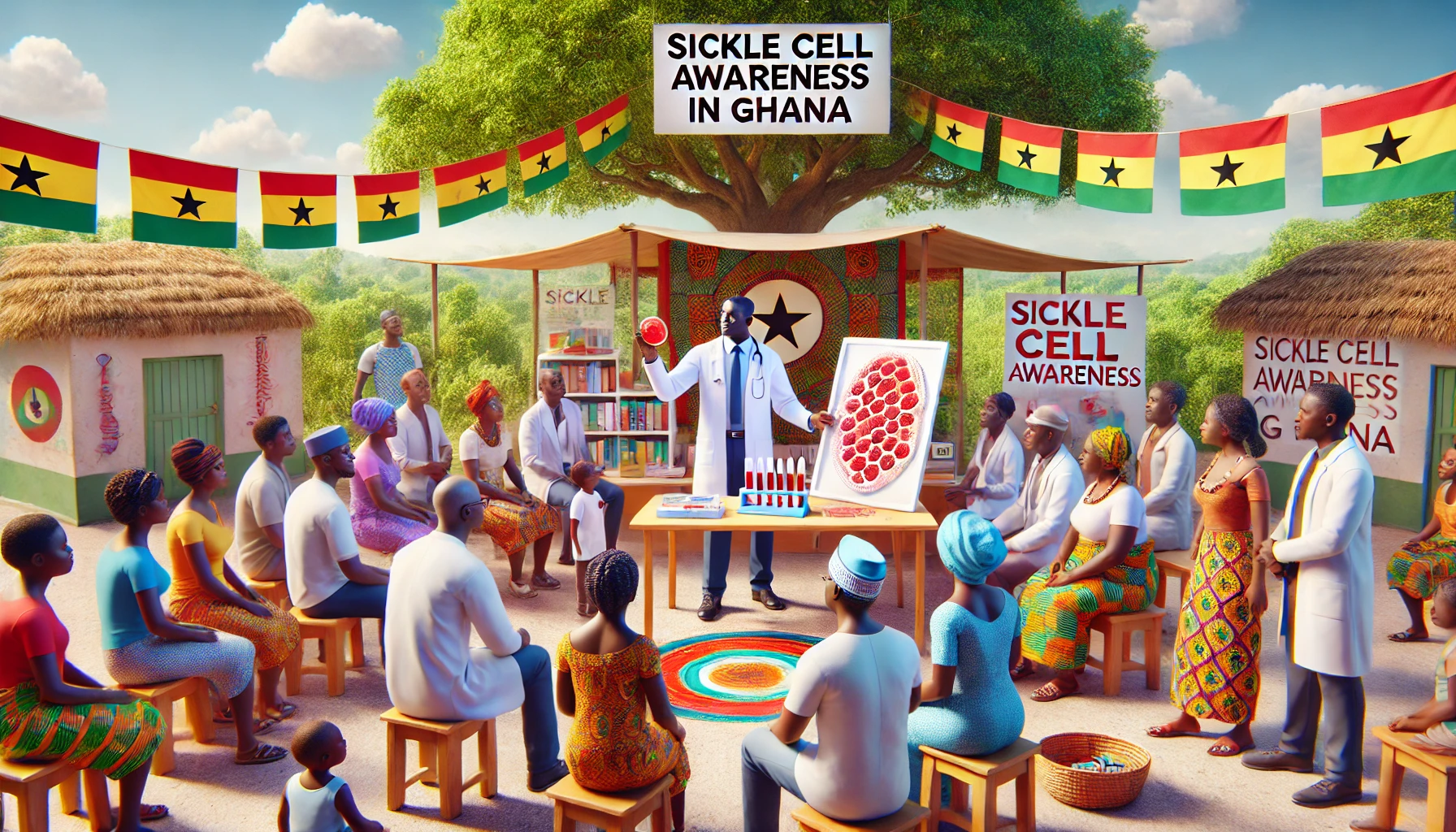
Sickle Cell Strong: Empowering Ghanaians with Knowledge and Practical Solutions 🩸🔴🤕
Sickle Cell Disease (often shortened to “SCD”) is a genetic blood condition that affects many people in Ghana and across Africa. In this article, we will explain what sickle cell disease is, how it occurs, how it is inherited, common myths, and ways to manage and prevent complications. We have divided this information into parts so it is easier to follow.
Part 1: What Is Sickle Cell Disease?
- Definition: Sickle cell disease is an inherited condition in which the red blood cells (RBCs) develop a curved, “sickle” (crescent) shape instead of the normal round shape.
- Why It Happens: A small change (mutation) in the gene that makes hemoglobin (the protein in RBCs that carries oxygen) causes the cells to become rigid and “sickle-shaped.”
- Why It Matters: These sickle-shaped cells can clump together and block blood flow. This blockage can lead to serious health problems like pain (called a “crisis”) and damage to organs.
Key Points
- SCD vs. Normal Anemia: While people with sickle cell disease have anemia, SCD is not the same as simple iron-deficiency anemia. It is a specific genetic disorder.
- SCD vs. Thalassemia: Thalassemia is another genetic condition affecting hemoglobin. Although both are blood disorders, they are caused by different genetic changes.
- Who Can Get It?: Both men and women can inherit SCD. You can only have the disease if you receive defective genes (one each) from both parents.
Images are only illustrative; may not pass an academic critique
Part 2: How Sickle Cell Disease Is Inherited
- Genotypes: Common ways to describe sickle cell–related genotypes include:
- AA: Normal hemoglobin (no SCD).
- AS: “Sickle Cell Trait” (carrier). Typically, carriers do not have severe symptoms, but they can pass the sickle gene to their children.
- SS, SC, Sβ-thalassemia: Types of sickle cell disease. “SS” is often referred to as the most common form. “SC” also causes symptoms, sometimes milder than SS. “Sβ-thalassemia” is a combination of sickle cell and thalassemia.
- Which Sickle Cell Can Marry?: Genetic counseling is recommended. Two individuals who are both AS (carriers) have a 25% chance with each pregnancy to have a child with SCD (SS). AA and AS couples reduce the risk of having a child with full-blown SCD, but a child could still inherit the carrier status.
- Can Sickle Cell Be Transmitted through Kissing or Other Contact?
- No. Sickle cell disease is not contagious. It is only passed through genes inherited from the parents.
Images are only illustrative; may not pass an academic critique
Part 3: Common Myths and Real Facts
Below are some frequently asked questions or myths about sickle cell disease, especially in Ghana:
- Are sickle cell babies active? Yes, children with SCD can be active, although they may tire more easily or need special care to prevent crises.
- Are sickle cell patients prone to malaria? Yes, people with SCD can still get malaria and often have a harder time fighting off infections. They are notfully immune to malaria.
- Carriers (AS) tend to have some protective advantage against malaria, but this does not mean they cannot get it.
- Are sickle cell patients “immunocompromised”? In some ways, yes. SCD can weaken the spleen, an organ that helps fight infections. This makes people with SCD more prone to infections. However, they are not automatically “immunocompromised” in the same way as someone on certain cancer treatments.
- Are sickle cell patients skinny? Body weight varies from person to person. While some people with SCD might appear slimmer due to chronic illness or reduced appetite, it is not universal that all are skinny.
- Are sickle cell patients immune or resistant to malaria? No. Patients who have the full disease (SS genotype) are not immune to malaria. Carriers (AS) have partial protection but can still get malaria.
- Are sickle cell and lupus related? Not directly. They are different conditions. Sickle cell is a genetic disorder affecting red blood cells, whereas lupus is an autoimmune disorder.
- Are sickle cell anemia and thalassemia the same? No. They are different genetic disorders that affect hemoglobin differently.
- Can sickle cell be cured permanently? A bone marrow transplant (or stem cell transplant) can potentially cure SCD, but it is expensive, not widely available in Ghana, and comes with risks. Research into gene therapy is ongoing. Most management focuses on reducing symptoms and complications.
- Can sickle cell kill you? Yes, if not properly managed, sickle cell disease can cause life-threatening complications. However, with proper care, many people live full lives.
- Can sickle cell patients give birth? Yes. Women with SCD can get pregnant, but they need close medical monitoring due to the risk of complications during pregnancy.
- Can sickle cell status change over time? No. Your sickle cell genotype (AA, AS, SS, etc.) is determined by your genes and does not change.
- Can sickle cell patients donate blood? Generally, people with sickle cell disease (SS, SC, etc.) are discouraged from donating blood, as their blood may not be optimal for donation and their own health can be compromised by losing blood. Carriers (AS) can usually donate if they meet other criteria.
Images are only illustrative; may not pass an academic critique
Part 4: Symptoms, Complications, and Prevention
4.1 Common Symptoms
- Tiredness or weakness (anemia).
- Occasional yellowing of the eyes (jaundice).
- Episodes of severe pain called sickle cell crises.
- Swelling of hands and feet in young children (dactylitis).
- Delayed growth or puberty in some children.
4.2 Complications to Watch Out For
- Frequent infections: Because the spleen can be damaged, people with SCD are more prone to infections.
- Stroke: Blocked blood vessels in the brain can lead to a stroke.
- Acute chest syndrome: Chest pain, fever, and breathing difficulties caused by sickling in the lungs.
- Leg ulcers: Slow-healing sores on the lower legs.
- Organ damage: Repeated sickling can damage organs over time.
4.3 Prevention and Precautions
- Regular Check-ups: Visiting clinics regularly to check hemoglobin levels, organ function, and overall health.
- Vaccinations: Protects against pneumonia, meningitis, and other infections.
- Malaria Prevention: Use mosquito nets, insect repellents, and take malaria prophylaxis if recommended by your doctor.
- Healthy Diet & Hydration: Eating balanced meals and drinking enough water help reduce sickle cell crises.
- Avoid Extreme Temperatures and Stress: Extreme cold or heat can trigger pain crises; adequate rest is essential.
Images are only illustrative; may not pass an academic critique
Part 5: Management, Treatment, and Living Well
Medications
- Folic Acid: Helps make new red blood cells.
- Hydroxyurea: Reduces frequency of crises for many patients and boosts fetal hemoglobin, which can lessen symptoms.
- Pain Relievers: For controlling crisis pain.
- Antibiotics: Particularly in young children, to prevent infections.
Blood Transfusions
- Used to treat or prevent certain complications like stroke. However, transfusions must be done carefully to avoid iron overload.
Bone Marrow or Stem Cell Transplant
- This is the only currently available cure, but it is expensive, requires a matching donor, and not always accessible.
Lifestyle Tips
- Stay Hydrated: Helps prevent sickling.
- Healthy Diet: Aim for foods rich in vitamins and minerals.
- Regular Medical Follow-Up: Helps catch complications early.
- Family Planning: Genetic counseling can guide couples on the risks of passing SCD to their children.
- Gentle Exercise: Helps overall health, but avoid pushing too hard to prevent crises.
Part 6: Frequently Asked Questions (FAQ)
Can Sickle Cell Patients Take Blood Tonic or Iron Supplements?
- Only under the guidance of a qualified health professional. Some patients already have enough or even too much iron. Always consult your doctor before taking any supplements.
What Sickle Cell Patients Should Avoid?
- Dehydration (not drinking enough water),
- Extreme temperatures,
- Stress,
- Strenuous exercise without rest,
- Exposure to infections (e.g., by not washing hands or skipping vaccinations).
Why Is Sickle Cell Common in Africa (Including Ghana)?
- The gene mutation became more common where malaria is endemic, partly because carriers (AS) have some protection against severe malaria. Over generations, this mutation persisted in populations where malaria was frequent.
What if Someone Has the Trait (AS) and Not the Disease (SS)?
- Such individuals are called “carriers.” They usually have few or no symptoms of SCD, but they can still pass the sickle gene to their children. They are not fully immune to malaria, but they may have milder malaria infections.
Is It Possible to Lead a Normal Life with Sickle Cell Disease?
- Yes, with careful management, regular check-ups, and a healthy lifestyle, people with SCD can have fulfilling lives—study, work, marry, and have children. Proper treatment reduces the risk of severe complications.
When Was Sickle Cell Discovered?
- It was first described in 1910 by a doctor who noticed the “sickle” shape of a patient’s red blood cells under a microscope.
Where Does Sickle Cell Hurt?
- Pain can occur anywhere blood flow is reduced, often in the bones (arms, legs, back), chest, and abdomen.
Why Is Sickle Cell Painful?
- When sickle-shaped cells get stuck in small blood vessels, they block the flow of blood and oxygen, causing intense pain called a crisis.
Images are only illustrative; may not pass an academic critique
Conclusion
Sickle cell disease is a significant health issue in Ghana. It is not contagious, but inherited. Early diagnosis, regular check-ups, appropriate medication, and a healthy lifestyle are crucial for reducing complications. Although it can be serious, many individuals with sickle cell disease lead meaningful and productive lives with the right support.
If you or a family member has questions about your sickle cell status, visit a reputable health facility for testing (hemoglobin electrophoresis or other specialized tests). Always consult trained healthcare professionals or genetic counselors if you are planning a family. Keep in mind that new research and treatments are emerging; staying informed and getting good care is key.
Remember: You are not alone. Talk to your doctor, nurse, or a support group, and encourage friends and relatives to know their genotype. By raising awareness and supporting one another, we can reduce the impact of sickle cell disease in Ghana.
- Ghana’s Blood Group Bible | Busting Myths, Saving Lives – From O+ to AB- 🩸
- Silent Fatigue, Loud Solutions: Ending Anaemia’s Reign on Ghanaians 🩸🆘
- Building Immunity: Your Path To a Disease-Free Future 💪
- The Ultimate Guide on Common Infections in Ghana📖: What You Need to Know and How to Stay Healthy 🤒🦠🏥
- Health Insurance Policies in Ghana for the Ordinary Ghanaian: A Complete Guide 🏥💊🛡️

We Love to Educate for Free
But please do not self-medicate as wrong doses of even correct medications can cause serious complications like kidney failure and even death. You can talk to a LICENSED health professional (including medical doctors, specialists, physician assistants, clinical psychologists, nutritionists/dieticians, medical herbalists, etc) by downloading the Deluxe Hospital app here:










